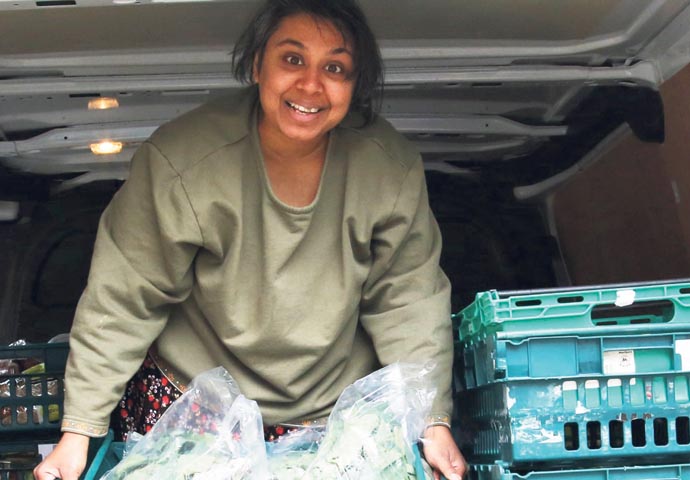A time to deal with food poverty
FORUM: ‘We need a better system… many food banks lack volunteers, space and storage, which limits what they can deliver,' says Farrah Rainfly, operations manager of Lifeafterhummus Community Benefit Society
Thursday, 18th August 2022

Farrah Rainfly
AT Lifeafterhummus Community Benefit Society food bank in Somers Town, we have been helping people in food poverty for a while.
We know the general situation is worsening. A crisis is coming into view. Now is a good time to improve how we deal with food poverty.
We need a better system. Many food banks lack volunteers, space, and enough storage, which limits what they can deliver.
Whether charities should be carrying so much of the burden of alleviating food poverty is another issue of concern. They are doing their best to offer a universal service that ought, on the face of it, to be provided by the state.
The city of Milan – the first major city to enforce a citywide food waste policy – offers hope for food aid campaigners in Camden.
It has put surplus food collection and delivery to distribution centres on a systematic footing. Last year Milan received the inaugural Earthshot award for its transformative work.
Since 2019 supermarkets, businesses, and company canteens have committed to delivering their waste food to “community level hubs” in publicly-owned buildings in Milan.
The city encourages them to contribute their surplus food with 20 per cent waste tax breaks; some 20 supermarkets, four company canteens and 24 third-sector groups are now involved.
Each of Milan’s three hubs recovers around 130 tonnes of food per year, equivalent to 260,000 meals. CO2 emissions are prevented as a result. Two more hubs were in the pipeline when the Earthshot prize was announced.
We think Camden could operate a great food aid safety net with four or five hubs. Our own food bank in Somers Town already collects and redistributes 60 tonnes of surplus food a year that would otherwise go to waste; about half of what each of the Milan hubs are processing.
We want to operate more efficiently inside a Milan-style framework incentivising large organisations in our area, for example, the corporates at KX, Knowledge Quarter, UCLH and UCL, to systematically deliver their food waste to us.
Like us, each Milan hub offers users more than food aid. Family services and advice about training, work, health, and so forth, are all available. Our own social prescription service covers all these bases too.
The Milan hubs are nicely organised. Users get food from a spacious retail-like setting like a pared-down supermarket. We like this dignified approach to food charity and think it can be replicated here if food banks can get more than just the crumbs off the property market table.
Milan emphasises keeping food waste local, something we agree with wholeheartedly. Waste shouldn’t travel far from the organisations which contribute to it. For example, our local model results in 62 per cent of redistributions and 37 per cent of collections to be carbon avoided.
Locations for hubs in Camden are probably places like Somers Town, Camden Town, Kilburn High Road, or Queen’s Crescent.
We can imagine Camden running a pilot hub as Milan did in 2018. Milan commissioned one of the city’s business schools to design their pilot.
The same organisation has since monitored the performance of the hubs. According to Milan’s vice-mayor, careful data analysis and co-ordination across multiple organisations have been critical to the hubs’ success. The structured approach taken by Milan should guide us here in Camden.
The world of food aid in Camden is very difficult to navigate. Camden Food Network and Camden Food Poverty Alliance operate in the field not always very effectively.
They generate projects, strategies, partnerships, reports, campaigns, advisory groups and so forth and a huge management overhead that leads us away from improving operations on the ground.
The Milan approach offers us a template and a way out of the overcomplicated world of food poverty in London.
We need to up our game.
• Farrah Rainfly is operations manager, Lifeafterhummus Community Benefit Society, NW1 1ES
www.lifeafterhummus.com